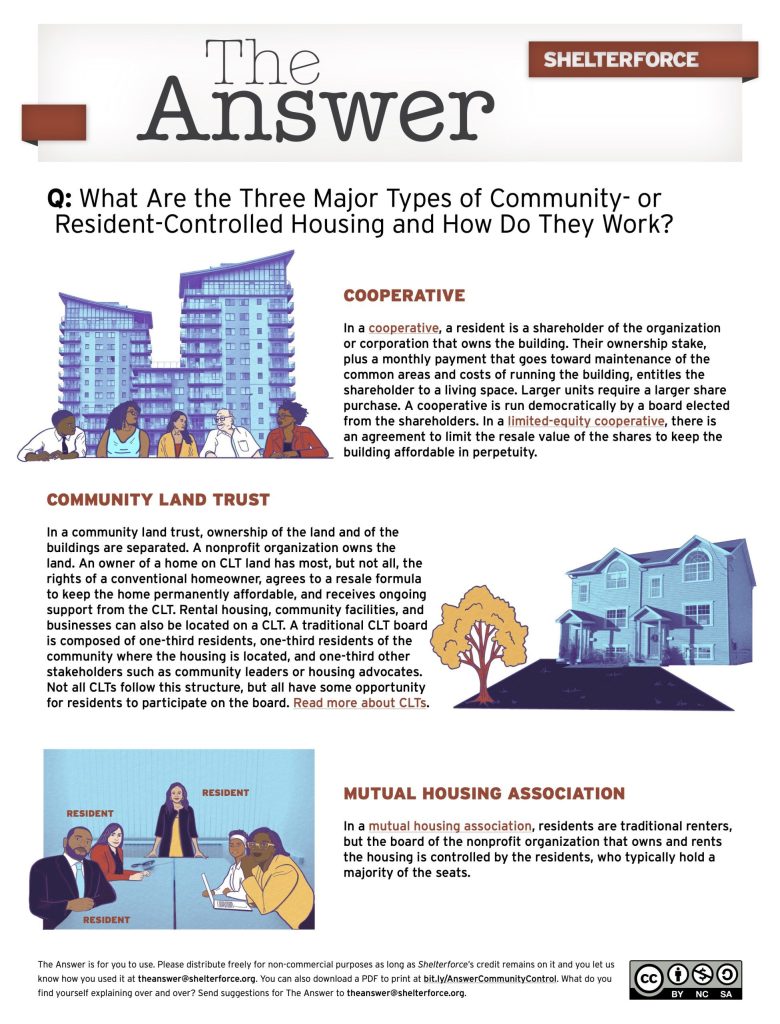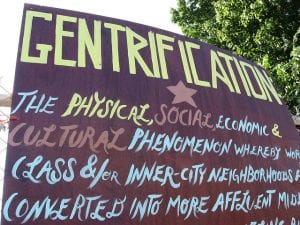Tag
limited equity co-ops
The Latest

Q: What Are the Three Major Types of Community- or Resident-Controlled Housing and How Do They Work?
There's a lot of momentum toward resident-controlled housing. Do you know the three major forms it takes?
Search & Filter Within this Topic
filter by Content Type
filter by Date Range
search by Keyword

Cooperatives and Community Land Trusts: Natural Partners?
Community land trusts provide far fewer units than other forms of affordable housing, but advocates now believe the model can be one possible solution to preserving the affordability of limited-equity co-ops. We take a closer look.

From Mobile Home Parks to Multifamily Housing Cooperatives
As tenants organize to take over their buildings, there’s been an increased interest in going the co-op route. Could the networks that support resident-owned mobile home park communities shift their focus to support residents of multifamily buildings that want to go co-op?

Lessons from 20 Years of Enabling Tenants to Buy Their Buildings
As cities across the country consider giving tenants the right of first refusal, municipalities must be meticulous in crafting policies that preserve and expand tenants’ ability to form housing cooperatives.

Giving Tenants the First Opportunity to Purchase Their Homes
Versions of a law known as the Tenant Opportunity to Purchase Act are being proposed across the country—in places like New York, Massachusetts and California. Could giving tenants a first right of purchase further protect renters?

It Doesn’t Matter if Your Neighborhood Is Going to Eventually Gentrify
“We could use some gentrification here.” Let’s never say this—we must refrain from debating the long-term likelihood of gentrification in distressed places.

Investment Without Displacement: From Slogan to Strategy
How investments can be leveraged to ensure residents get to stay in their communities and reap the benefits of new amenities and increased accessibility.

Homeless Vets Given Keys to a New Home and Life
The Gordon H. Mansfield Veterans Community in Agawam, Massachusetts, offers housing for homeless veterans, along with access to various other supportive services.

Solutions to an Unjust Housing System
Four scalable land and housing models can provide justice, and homes, for our communities. But we need support to protect them from market pressure.

The State of Permanent Affordability
In the face of accelerating gentrification, along with ongoing speculation and eviction, the idea of putting a substantial number of homes outside of the reach of the speculative market has been gaining momentum across the country.

A Low-Cost Ownership Oasis in a Desert of Apartment Unaffordability
When this limited-equity cooperative in California began more than 30 years ago, it wasn’t the most affordable place to live. But now the co-op’s monthly costs are 50 percent lower than the average market-rate apartment.

The State of Shared-Equity Homeownership
Though the need is greater than ever for resale-restricted, affordable homes, the growth of this model of homeownership appears to be limited.

Co-ops: Resistance to Living in the Land of the Lord
For Section 8 recipients, a step toward economic mobility (and community control) can be limited-equity cooperatives. A Section 8 voucher can be used to pay some of the monthly carrying costs of a co-op unit.
